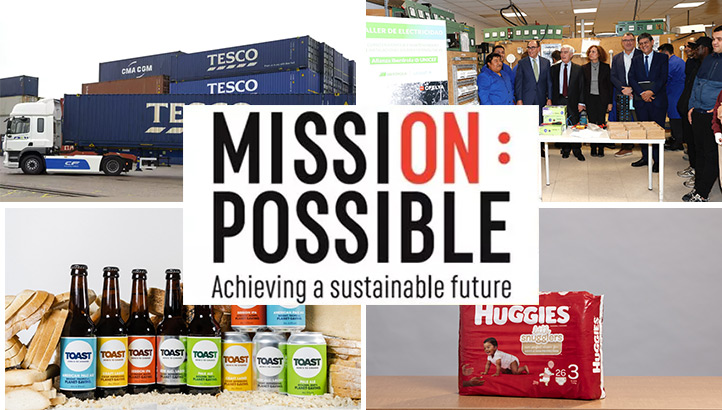Read on for success stories from Tesco, Toast Ale and more
Published every week, this series charts how businesses and sustainability professionals are working to achieve their ‘Mission Possible’ across the campaign’s five key pillars – energy, resources, infrastructure, mobility and business leadership. We are returning with this series after a two-week break around COP27.
Across the UK and the rest of Europe, leading businesses, cities, states and regions are turning environmental ambitions into action. Here, we round up five positive sustainability stories from this week.
Please note that this will be the last edition of this feature for 2022, as edie’s publisher, Faversham House, will be closing for Christmas on 23 December and will reopen on 3 January 2023.
ENERGY: Iberdrola partners with Unicef to help young people into energy careers

In this part of the weekly success stories roundup, we often shine the spotlight on a new renewable energy project or an organisation that is going above and beyond to improve energy efficiency or showcase innovative technologies.
But this week, we have a slightly different story. Iberdrola has announced a new partnership with Unicef, under which it will train and employ young people from disadvantaged groups, including those who have dropped out of mainstream education. The energy major has committed €3m to the initiative and is seeking, along with the NGO, additional partners.
The partnership will feed in to the UN and Unicef’s ‘Generation Unlimited’ initiative, which first launched in 2018 in a bid to connect young people with opportunities for training, employment and social entrepreneurship. Iberdrola’s involvement will enable the launch of a dedicated workstream in Spain, with the support of several local social NGOs.
Unicef Spain’s president Gustavo Suarez Pertierra said: “Every young person must have the opportunity to develop personally, professionally and vitally, especially those who find it most difficult. This is the only way to achieve sustainable and inclusive social progress.”
RESOURCES: Kimberly-Clark posts success with nappy composting trials

Every year, some 167 billion disposable nappies are manufactured. These present a waste management challenge, given that they can take hundreds of years to break down in landfill.
Kimberly-Clark Australia has sought to tackle this issue by scaling an anaerobic digestion solution for the organic materials contained in used Huggies nappies. It has been working with national science agency CSIRO, composter Peats Soils and Garden Supplies and Solo Resource Recovery to trial the processing method on nappies collected via early learning and childcare provider G8 Education.
This week, the consumer goods giant revealed that the ‘Nappy Loop’ scheme will be progressing past the trial stage. It also confirmed a partnership with APR Plastics to explore the chemical recycling of the plastics recovered from the nappies.
“Identifying a recycling solution that works hasn’t been easy due to the availability of technology and collection systems,” said Kimberly-Clark Australia and New Zealand’s managing director Belinda Driscoll. “Today is a very proud day for us, announcing that we have trialed right here in Australia, and it represents a big step in Kimberly-Clark ANZ’s sustainability strategy.”
MOBILITY: Tesco and Ball post efficiency improvements from better route planning

‘Tesco Tetris’ has made headlines this week, with the supermarket posting progress with a new route planning approach that will reduce milage for its fleet of trucks this festive season.
Tesco’s distribution team has worked with 15 of the retailer’s largest suppliers to consolidate and streamline delivery routes. The initiative has also seen a focus on filling empty gaps in trucks, further boosting efficiency.
In related news, aluminium packaging giant Ball Corporation has posted strong results from a partnership with logistics provider Woodland Group, that saw shipments shifted from road to rail where possible. More than 1,400 forty-foot equivalent trainers were moved by rail, resulting in carbon savings of 886 tonnes.
THE BUILT ENVIRONMENT: Net-zero health centre opens to patients in Wiltshire

Historically, the NHS has reduced emissions by just 1% each year, but the level of annual reductions will need to hit 8% if the 2040 net-zero target is to be delivered.
A sustainability success story from the NHS this week comes from NHS Property Services, which manages more than 3,000 buildings across the NHS estate in England. The organisation has formally opened a new health centre that is net-zero in terms of operational emissions in Wiltshire.
The Devizes health centre has an EPC rating of A+ thanks to an energy-efficient fabric design. It is fitted with energy-efficient lighting and heating, with heating provided by heat pumps rather than fossil fuel systems. The centre boasts onsite solar, too, and is classed as self-sufficient in terms of energy use.
A variety of different services, including blood testing, physiotherapy, and same-day care, will be based in the £10.9 million centre.
BUSINESS LEADERSHIP: Big brewing players help to raise £2m for Toast Ale

Regular readers of edie will be aware of Toast Ale, the British brewery that was founded to turn surplus bread into beverages. Toast Ale was subsequently certified as a social enterprise and B Corp.
This week, the business closed its ‘Toast for Equity’ investment round, securing more than £2m for initiatives that will enable partnerships with more bakeries and the implementation of bread ‘upcycling’ processes at more breweries. Toast has collaborated with 86 breweries since its launch in 2016.
Contributors to the fund include the National Geographic Society, Heineken and former Unilever boss Paul Polman.
“We set out with a mission to brew great beers and spread big ideas that can change the world, and are proud of the positive impact we have,” said Toast Ale co-founder and chief operating officer Louisa Ziane. “Collaboration has always been key to our strategy for achieving change, and we’re excited to be able to scale our work to support bakeries and breweries to embrace the circular economy.”
© Faversham House Ltd 2022 edie news articles may be copied or forwarded for individual use only. No other reproduction or distribution is permitted without prior written consent.

